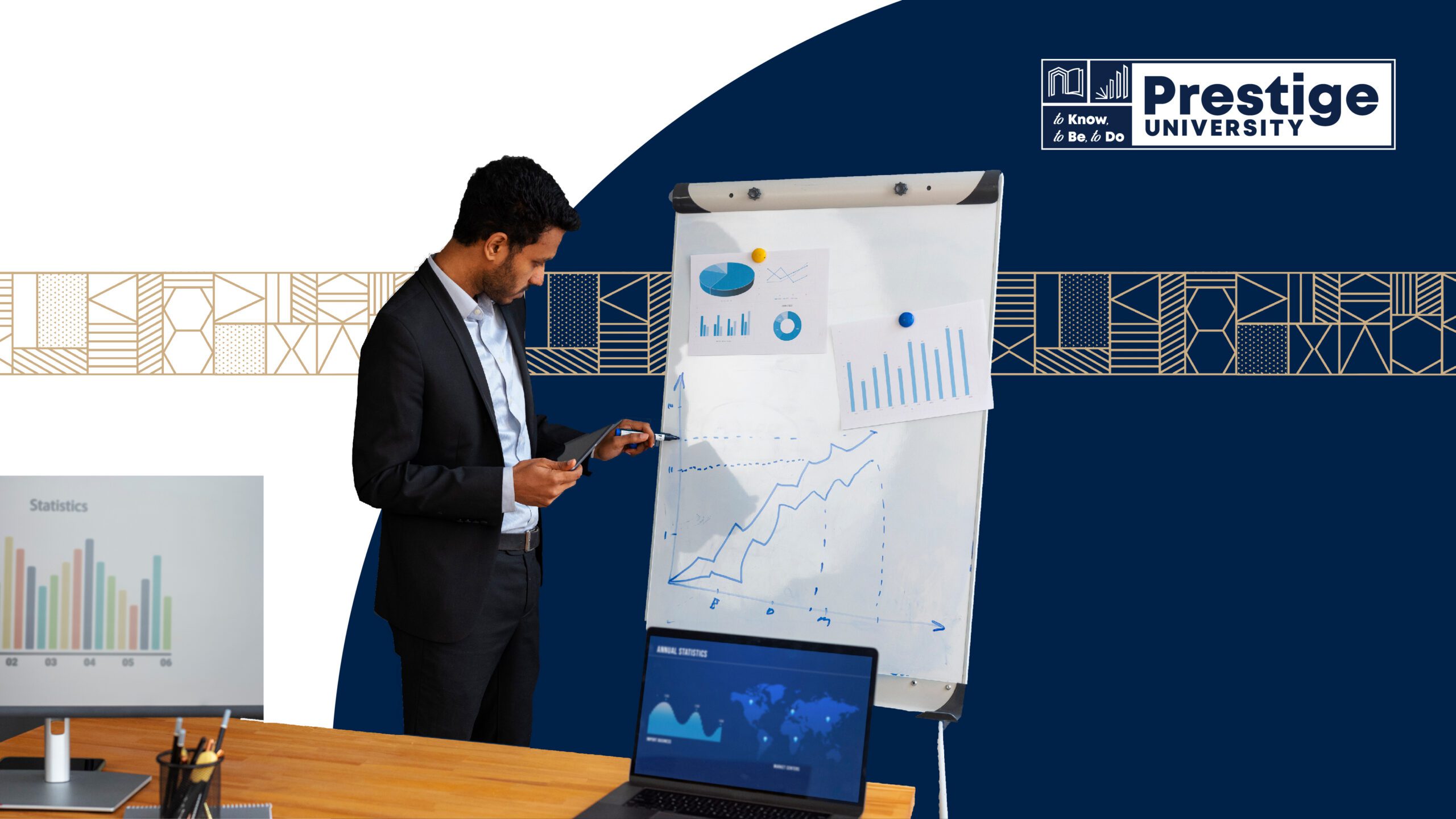Technological advancements in the past few decades have witnessed a whirlwind of events that have shaped the world. From geopolitical changes and economic recessions to pandemics and climate crises, the global population of Millennials and Gen-Z have seen more changes than any generation ever before. In this crucible of challenges, education institutes including the best MBA universities in India are emerging as torchbearers of change by shaping the leaders of tomorrow who can navigate the complexities of the modern world. To know more about how we are empowering our students to address the needs of the ever-changing world, keep reading.
Are Universities Prepared for Interconnected Realities of the 21st Century?
The challenges of this century are multi-faceted and interconnected in ways that are sometimes not easily comprehensible, demanding an integrated approach. Geopolitical shifts with strategic competition and tensions between nations, increasing cybersecurity concerns, and energy security have and are creating major shifts in the global landscape. Along with this, economic recessions, as evidenced in recent years, disrupt established norms, and mandate adaptive strategies to foster growth and resilience.
The COVID-19 pandemic, which revealed vulnerabilities in healthcare systems, highlighted the importance of robust, sustainable practices across various industries of administration, finance, food and agribusinesses, and overall crisis management. Parallelly, the march of globalisation has interconnected economies and societies like never before, necessitating leaders who understand international relations and the impact of decisions on global value chains. Along with these, the climate crisis has been on the rise for decades and demands urgent action. Sustainable solutions to mitigate environmental degradation, adapt to changing conditions, and foster a healthier future are the need of the hour.
Universities, as centres of learning, research, and innovation, should strive to provide a comprehensive understanding of these challenges.
How Do Prestige University’s MBA Programs Prepare You for Real-World Challenges?
MBA programs for today’s times must be designed to create a meaningful impact on the real world through a combination of quality education, practical skills development, and a commitment to preparing students for the complexities of the business landscape. Prestige University’s MBA programs are strategically designed to overlap with the key aspects of the United Nations’ Sustainable Development Goals, or SDGs, providing a targeted and comprehensive approach to addressing global challenges.


- MBA in Food & Agribusiness
Contributes to: Zero Hunger (SDG 2), Good Health and Well-being (SDG 3), and Clean Water and Sanitation (SDG 6)
MBA in Food and Agribusiness Management makes a direct contribution to SDG 2 by prioritising sustainable agricultural practices, thereby promoting food security, and addressing hunger. It emphasises the importance of producing safe and nutritious food, aligning with SDG 3 and contributing to enhanced health and well-being. Additionally, the emphasis on responsible farming practices supports clean water and sanitation, aligning with SDG 6. Students are well-prepared to transform agribusiness by implementing environmentally conscious and socially responsible strategies during an MBA in Food and Agribusiness. - MBA in E-Business
Contributes to: Industry, Innovation, and Infrastructure (SDG 9) and Decent Work and Economic Growth (SDG 8)
MBA in E-Business actively promotes innovation in both business models and technological infrastructure, thereby directly influencing the growth of industries in line with SDG 9. Through the cultivation of e-commerce and digital business, an MBA in E-Business generates job prospects and upholds favourable working conditions, aligning with SDG 8. Students are taught to navigate the digital landscape, contributing to economic prosperity while prioritising ethical and inclusive practices. - MBA in Logistics & Supply Chain
Contributes to: Decent Work and Economic Growth (SDG 8), Industry, Innovation, and Infrastructure (SDG 9), and Responsible Consumption and Production (SDG 12)
MBA in Supply Chain and Logistics enhances labour conditions and fosters economic growth by optimising supply chain management, aligning with SDG 8. By innovating logistics and infrastructure (SDG 9), students actively contribute to industry expansion. Additionally, they champion responsible consumption and production by implementing sustainable practices in the supply chain, supporting SDG 12. MBA in Logistics and Supply Chain empowers students to emerge as leaders adept at establishing efficient, ethical, and environmentally conscious supply chains. - MBA in General Management
Contributes to: Quality Education (SDG 4), Decent Work and Economic Growth (SDG 8), and Partnerships for the Goals (SDG 17)
MBA in General Management plays a crucial role in advancing quality education and skill development (SDG 4), contributing to a well-rounded education. By cultivating a comprehensive understanding of business, the program promotes economic growth, generates employment opportunities, and advocates for favourable working conditions (SDG 8). With a focus on collaboration and partnerships, students pursuing an MBA in General Management are empowered to actively participate in initiatives, aligning with SDG 17, and working collaboratively to achieve sustainable development goals.
How Does Prestige University Equip Students For The Current Business Landscape?
Prestige University is dedicated to cultivating a community of leaders with strong values, emphasising the significance of ethical business practices and sustainability. Courses offered by Prestige University provide cooperative programs enabling students to apply theoretical knowledge to practical situations, instilling an entrepreneurial mindset essential for addressing intricate global challenges.
Faculty members at Prestige University actively participate in thematic research tackling urgent global issues. Their endeavours serve as a basis for resolving practical problems, such as establishing sustainable agricultural methods, building resilient supply chains, and addressing the repercussions of climate change.
At Prestige University, the commitment to preparing students for the dynamic challenges of the modern world is reflected in its innovative approach to education.
- Tailored Courses
Recognising the intricate nature of sustainable development, MBA courses at Prestige University acknowledge the inadequacy of a uniform approach. Courses embedded in each MBA course guarantee that students acquire specialised knowledge and skills pertinent to their specific areas of interest.For example:- Sustainable management courses like an MBA in Sustainability Management delve into eco-innovation to maximise efficiency, leading organisations on the sustainability front, and enabling sustainable livelihoods
- E-business-focused modules in the MBA in E-Business program scrutinise the intricacies of digital transformation, product and revenue management, and new frontiers such as VR/AR and automation.
- Food and agribusiness management programs like MBA in Food and Agribusiness provide exposure and guidance to adapt to changing consumer preferences, transforming end-to-end agri value chains, and implementing sophisticated agri-financing strategies.
- A program in Data Analytics and business intelligence like an MBA in Data Analytics can teach one how to structure business problems, apply analytical techniques, and create sustainable business impact.
- Logistics and supply chain management programs like MBA in Supply Chain and Logistics help innovate business solutions that build complex supply chains and design supply chains for superior customer service.
- Co-op Programs
Cooperative Education at Prestige University extends beyond conventional classroom instruction, emphasising practical learning experiences pertinent to the best MBA universities in India. Through co-op programs, students have the opportunity to apply theoretical knowledge to real-world scenarios, participating in activities such as supply chain projects and promoting eco-friendly business practices. This hands-on approach equips students with invaluable insights, shaping them into well-rounded professionals poised to make a meaningful impact from the outset of their careers. - Interdisciplinary Learning
Acknowledging that real-world challenges frequently extend beyond the confines of specific disciplines, Prestige University’s courses cultivate an interdisciplinary learning approach. Collaborative projects involving students from diverse areas and interests emulate the global business landscape. This approach not only cultivates a comprehension of issues but also fosters innovative problem-solving — an essential skill in the interconnected world of today. - Value-based Leaders
Prestige University is committed to cultivating a community of leaders who exemplify not only exceptional business acumen but also a commitment to ethical practices. At the core of the university’s philosophy is a premium placed on instilling values that resonate with global citizenship and highlight the importance of responsible leadership. This commitment extends beyond business education, aiming to nurture individuals to not only excel in their professional pursuits but also actively contribute to the betterment of society through a holistic and values-driven approach. - Quality Mentorship and Resources
Prestige University recognises the significance of mentorship in moulding upcoming leaders. Its mentorship initiatives grant students the opportunity to engage with seasoned professionals and industry experts who offer guidance, share their experiences, and assist in navigating the intricacies of the business world. Furthermore, the MBA courses at Prestige University guarantee that students have access to cutting-edge resources, empowering them to stay at the forefront of their respective fields. - Entrepreneurial Mindset
Prestige University stands out in its dedication to cultivating an entrepreneurial mindset among its students. Going beyond traditional business approaches, the university encourages students to think creatively, recognise potential opportunities, and develop sustainable solutions. Whether aiming for careers within established corporations or initiating their enterprises, Prestige University’s students possess the entrepreneurial spirit essential for navigating the constantly changing global business environment.
- Sustainable Supply Chain Practices
Faculty members are actively involved in research, focusing on identifying strategies to mitigate environmental impact, improve working conditions, and advocate for responsible consumption and production. Through their academic pursuits, they aim to contribute valuable insights and solutions that foster a more sustainable and ethically conscious approach to supply chain management. - Renewable Energy Integration
The research conducted is also dedicated to the seamless integration of renewable energy sources into established infrastructures, which pertains to ensuring access to affordable and clean energy. This multifaceted approach involves exploring innovative strategies and solutions to enhance the efficiency and sustainability of energy utilisation, thereby promoting the widespread adoption of cleaner and more affordable energy alternatives.
The university also delves into innovative approaches for community-driven development, with a particular focus on fostering social entrepreneurship and inclusivity as integral components in the fight against poverty and addressing inequality. The research seeks to examine and promote models that empower local communities, emphasising the importance of collaborative efforts and sustainable practices to create lasting positive impacts on livelihoods and societal well-being.
What Makes Prestige University a Leading Choice for an MBA
Prestige University is deeply committed to nurturing value-based leaders, a commitment that is prominently reflected in its robust mentorship programs and the accessibility of resources. These initiatives are strategically designed to equip students of top private MBA universities with the essential guidance and tools necessary for ethically and sustainably navigating the business world. By emphasising the cultivation of an entrepreneurial mindset, the institution is preparing graduates not as job-seekers, but rather, it moulds them into innovators capable of instigating positive change and devising sustainable solutions.
A key facet of the university’s distinctive approach lies in its faculty, whose involvement in thematic research aligned with real-world problems serves as a testament to the institution’s dedication to making impactful contributions. This commitment resonates with the broader goal of fostering individuals who can actively address and solve the pressing challenges faced by society.
Through its innovative educational strategies and dedication to addressing real-world challenges, Prestige University transcends the conventional role of a higher education institution. In essence, Prestige University is not merely shaping careers, it is forging a lasting legacy of positive and meaningful contributions that extend far beyond the academic sphere.









